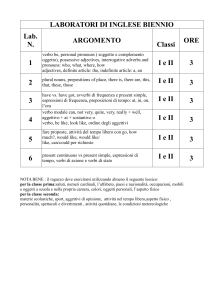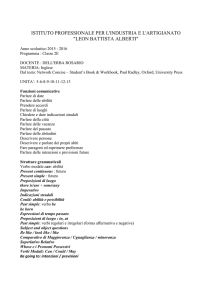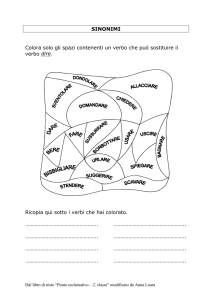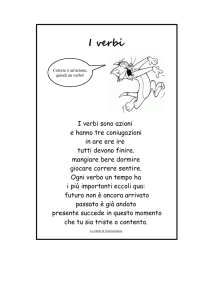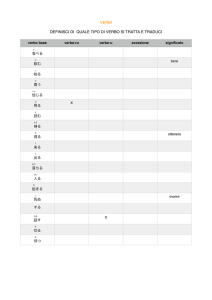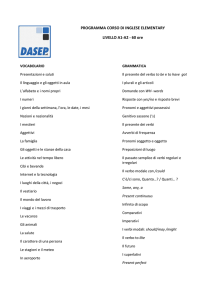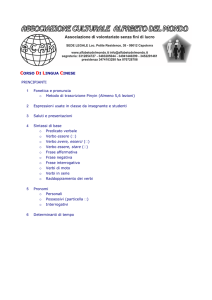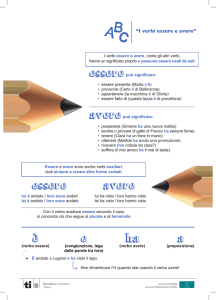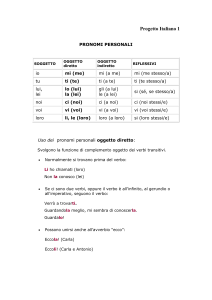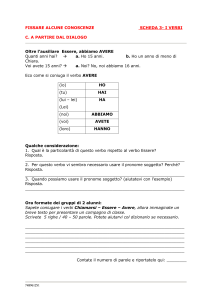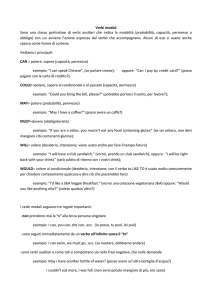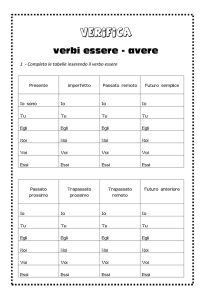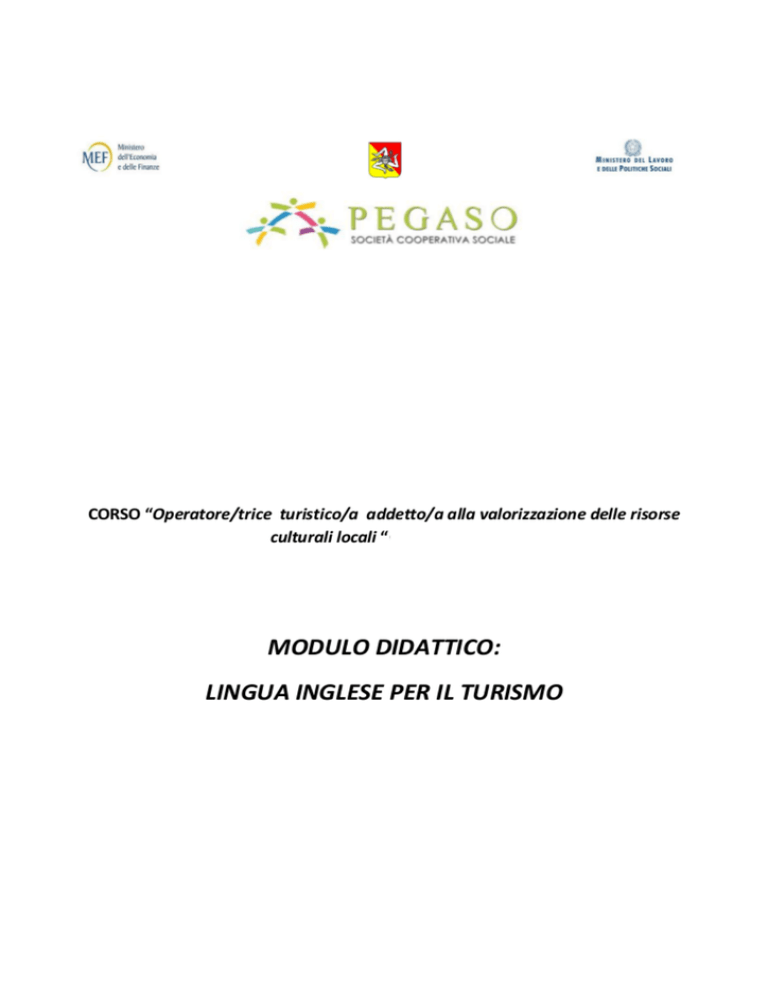
Indice degli argomenti trattati
Nozioni grammaticali
I pronomi personali soggetto e complemento
Verbi ausiliari: essere- avere ( presente- passato forma negativa e interrogativa)
Verbi regolari e irregolari
Articoli determinativi e indeterminativi
Negazione con do –does- did
Preposizioni di luogo
Futuro
La forma in “ing”
Periodo ipotetico di primo tipo
Verbi modali
Costruzione del verbo to like
Nozioni di base del settore turistico:
vocabolario turistico- nomi dei vari ambienti di un albergo
frasi da usare in un’agenzia turistica
formulazioni di diversi tipi di lettere commerciali: di prenotazione, di rifiuto
booking on line
creazione di una Brochure
lettura – traduzione di testi turistici
La docente: Maria Rosella Martorana
1
PRONOMI PERSONALI SOGGETTO
Il pronome personale soggetto in inglese va sempre espresso, mentre in italiano è spesso sottinteso.
Es. Siamo italiani We are Italian.
Il pronome personale, in inglese, può essere sottinteso solo in frasi coordinate introdotte da and, but, or che
abbiano lo stesso soggetto.
Es. Lui è italiano ma vive in Inghilterra
He is Italian but lives in England
Il pronome personale I (prima persona singolare) è sempre scritto con la lettera maiuscola.
I pronomi personali soggetto sono:
FORMA
SINGOLARI
PLURALI
I
IO
WE - NOI
YOU - TU
YOU -VOI
HE / SHE / IT -EGLI /ELLA/ESSO
THEY –ESSI-LORO
-
PRONOMI PERSONALI COMPLEMENTO
Il pronome personale complemento può seguire:
- Un verbo
I like her (mi piace lei)
- O una preposizione
This present is for him (questo regalo è per lui)
Pronomi personali soggetto
I
You
He
She
It
We
You
they
Pronomi personali complemento
My
You
Him
Her
It
Us
You
them
2
Il verbo essere (TO BE)
Infinito = to più forma base del verbo
Infinito negativo = not to be
Forma
Affermativa e contratta
I am (I’m)
You are (you’re )
He is (‘s )
She is ( ‘s )
It is
( ‘s )
We are (we’re)
You are ( you’re )
They are (they’re )
negativa
I am not ( I’m not)
You are not (you
aren’t )
He is not (he isn’t)
She is not
It is not
We are not
You are not (aren’t )
They are not
Interrogativa
Am I …?
Are you ….?
Interrogativa negativa
Aren’t I ? am I not?
Are you not..?
Is he…?
Is she….?
Is it…..?
Are we….?
Are you ….?
Are they…?
Is he not…?
Is she not…?
Is it not…?
Are we not….?
Are you not…?
Are they not…?
Attenzione!
Le forme contratte sono tipiche della lingua inglese parlata o informale.
Passato (past simple) verbo essere ( to be)
Il past simple del verbo to be corrisponde all’imperfetto, al passato remoto e al passato prossimo
dell’italiano e si usa per:
-parlare di situazioni riferite a un tempo determinato del passato ed interamente trascorso
Es.: they were at home last night. (loro erano a casa ieri sera)
-
parlare della nascita (was/ were born)
-
When were you born?
affermativa
I was
You were
He/ she/ it was
We were
You were
They were
negativa
I was not (wasn’t)
You were not
He/ she/it was not
We were not (weren’t)
You were not
They were not
Interrogativa
Was I …?
Were you …?
Was he/ she/ it:::?
Were we ..?
Were you..?
Were they…?
Espressioni idiomatiche con to be
To be cold = avere freddo
to be right = avere ragione
To be hot = avere caldo
to be wrong = avere torto
To be hungry = avere fame
to be early = essere in anticipo
To be thirsty = avere sete
to be well/ fine = stare bene
3
Interrogativa negativa
Was I not…?
Were you not..?
Was he not..?
Were we not…?
Were you not…?
Were they not…?
Verbo avere ( Present simple ) TO HAVE
FORMA
I –you-we-they have (‘ve )got
He-she-it has (‘)got
I-you-we- they have not (haven’t) got
He – she-it has not
( hasn’t)got
Have I- you-we- they got…?
Has he-she-it got…?
Haven’t I-you- we-they got…?
Hasn’t he-she-it got…?
AFFERMATIVA
NEGATIVA
INTERROGATIVA
INTERROGATIVA NEGATIVA
ATTENZIONE!!!!!!
Se il verbo avere indica possesso si aggiunge ‘got’
Espressioni con il verbo to have
To have a cold = avere il raffreddore
To have a temperature = avere la febbre
To have a toothache = avere il mal di denti
PAST TENSE OF ”TO HAVE’
Il verbo to have , anche se usato come ausiliare, è un verbo irregolare e come tale al past single si
costruisce seguendo le stesse regole dei verbi irregolari sia quando esprime possesso o relazione che nelle
espressioni idiomatiche come : to havenbreakfast /lunch /dinner ecc.
FORMA
Affermativa
Soggetto più had
I-you- he-she-it-we-you-they had
Soggetto più did not have (didn’t)
I-you-he-she-it-we-you-they did have
Did più soggetto più have
Did I-you-he-she-it-we-you-they have…?
Didn’t più soggetto più hùve
Didn’t I-you-he-she-it-we-you-they have..?
Negativa
Interrogativa
Interrogativa negativa
Il verbo avere è usato anche in alcune espressioni idiomatiche in cui non esprime possesso ma ha valore di
verbo principale; in questo caso to have non è seguito da got,le interrogative, le negative richiedono l’uso
degli ausiliari do/ does al presente e did al passato
Es.. do you usually have a big breakfast?
4
ARTICOLI
ARTICOLO DETERMINATIVO
(definite article)
THE
Traduce l’italiano il-lo-la-i-gli-le e si usa con
sostantivi maschili, famminili e neutri, singolari e
plurali
The boy
the boys
The girl
the girls
The house
the houses
ARTICOLO INDETERMINATIVO
( indefinite article)
A - AN
Traduce l’italiano un- uno –una, un’ e si usa con
sostantivi maschili,femminilie neutri singolari
numerabili
A = davanti a consonante a cat
H aspirata a house
Al suono ju
a università
AN =davanti a vocale an orange
H muta
an hour
PREPOSIZIONI DI LUOGO
In =si usa in riferimento a un luogo chiuso e sottoscritto :we live in Rome
At = si usa in riferimento a u punto nello spazio con riferimento all’attività svolta nel luogo She is at
bus stop:
On = su,sopra ( con contatto) (on the wall)
Over = su ,sopra senza contatto
Under = sotto
Near = vicino usato in senso generico
Next to / beside = accanto, di fianco
Against = contro
In front of = davanti /di fronte
FORMA IN ING
La forma in ing si ottiene aggiungendo -ing- alla forma base del verbo ma ricorda che in alcuni casi è
necessario effettuare delle variazioni ortografiche
VARIAZIONI ORTOGRAFICHE
Nei verbi che terminano con – e muta, la e cade
I verbi monosillabi che terminano con una sola consonante
preceduta da una sola vocale raddoppiano la consonante
finale
I verbi bisillabi che terminano con una consonante
preceduta da una sola vocale accentata raddoppiano lsa
consonante finale
I verbi che terminano in ‘l’ preceduta da una sola vocale
raddoppiano la ‘l’
I verbi che terminano con ‘y’ mantengono la ‘y’ e
aggiungono ing
I verbi che terminano in ‘ie’ costruiscono la ‘in form’ come
segue
5
Arrive- arriving
Stop- stopping
Run- running
Begin- beginning
Prefer- preferring
Travel - travelling
Study- studying
Die –dying
Lie -lying
play-playing
the
VERBI REGOLARI
Present Simple
spiegazione e note: il Present Simple (verbo all’infinito; ‘do’ + infinito al neg. ed interrog.) si usa per azioni
abituali o dati di fatto. La forma affermativa si costruisce con l’infinito del verbo, mentre le forme negative
ed interrogative si costruiscono usando il verbo ‘do’ come ausiliare seguite dall’infinito.
N.B. la terza persona varia in quanto si aggiunge ‘s’ (o ‘es’ in alcuni casi) al verbo nella forma affermative,
all’ausiliare nelle forme negative ed interrogative.
esempi (con traduzione):
a ) Mio fratello vive a Milano.
My brother lives in Milan.
b ) Loro non giocano a tennis.
They don’t play tennis
c) Dove lavorate?
Where do you work?
d) Ogni quanto va al cinema David?
Where do you work?
e) Io non lavoro il sabato.
I don’t work on Saturdays.
VERBO To travel (viaggiare)
Affermativa:
Soggetto +forma base +s alla terza persona
singolare
I travel
You travel
He-she-it travels
We travel
You travel
they travel
Negative
Soggetto+do –does (terza persona singolare)+not
+forma base
I don’t travel
You don’t travel
He-she-it-doesn’t travel
We don’t travel
You don’t travel
They don’t travel
Interrogativa
Do +soggetto+forma base…?
Do I travel…?
Do you travel…?
Does he-she-it travel ..?
Do we travel…?
Do you travel----?
Do they travel…?
Interrogativa negative
Don’t +soggetto +forma base
Don’t I travel…?
Don’t you travel…?
Doesn’t he-she-it travel…?
Don’t we travel …?
Don’t you travel…?
Don’t they travel…?
VERBI MODALI
I verbi modali sono definiti tali perché esprimono le tre modalità di eseguire un’azione : potere- doverevolere.
I verbi modali hanno 2 forme – il presente ed il passato
6
il presente si forma con il verbo modale + infinito senza ‘to’;
il passato si forma con il verbo modale + have + participio passato.
‘I would’ si usa per formare il condizionale ed è l’unico che non ha un significato di per sé;
Possono essere considerati ausiliari perché reggono sempre un verbo ( anche se a volte è sottinteso).
I verbi modali hanno regole particolari rispetto ai verbi ordinari:
- non hanno la forma base e quindi nessuna delle forme da questa derivate ,come infinito,forma in –ing, o
participio passato . Nei tempi e nelle forme verbali mancanti vengono sostituiti da altri verbi o espressioni
verbali.
-Sono sempre seguiti dall’infinito senza il to , es : I can swim very well.
- Non prendono la ‘s’ alla 3 persona singolare del presente indicativo Es.:he must leave immediatily
- la forma negativa si costruisce aggiungendo ‘not’ dopo il modale es.: they may not arrive
-la forma interrogativa si costruisce anteponendo il verbo modale al soggetto es.: May I leave a message
for Mr.Smith?
Essi sono
Can - could= potere
May – might = potere in senso di permesso
Must = dovere
Shall.should –ought to = dovere
Will = volere
IL FUTURO SEMPLICE
Il futuro semplice (simple future) è costruito con gli ausiliari shall e will. Shall viene usato solo per la prima
persona singolare e plurale, will per tutte le altre; attualmente però prevale l’uso di will per tutte le persone.
AFFERMATIVO
Sogg. + will + infinito senza to (‘ll)
NEGATIVO
Sogg. + will not + infinito senza to (won’t/ ‘ll not)
INTERROGATIVO
Will + sogg. + infinito senza to ?
INTERROGATIVO – NEGATIVO
Won’t + sogg. + infinito senza to ?
La forma negativa contratta di shall è shan’t.
•Il simple future si usa:
-Per esprimere previsioni, supposizioni, opinioni relative al futuro
Mark will be of age soon.
Mark sarà maggiorenne presto.
“Do you think he’ll get a job?” “I think / hope so.” “I don’t think so./ I hope not.”
“Pensi che otterrà quell lavoro?” “Penso / Spero di sì.” “Non penso. / Spero di no.”
7
-Per esprimere una promessa, un’offerta
Dont’ worry. I won’t forget to post the letter.
Non preoccuparti, non dimenticherò di imbucare la lettera.
-Per esprimere un’azione non predeterminata, ma decisa sul momento
It’s getting dark in here. I’ll turn the light.
Si sta facendo buio qui. Accenderò la luce.
-Nel periodo ipotetico del primo tipo
If you don’t hurry you’ll miss the bus.
Se non ti affretti perderai l’autobus.
IL FUTURO INTENZIONALE
•Il futuro intenzionale (be going to) è costruito con:
soggetto +presente del verbo essere (am / is / are )+ going + infinito
•Il futuro intenzionale si usa per indicare:
-l’intenzione di compiere un’azione:
I’m not going to apologize. It’s his fault, not mine.
Non ho intenzione di scusarmi./ Non mi scuserò. È colpa sua, non mia.
-Un’azione o situazione imminente, che si prevede avvenga o che sta per avvenire:
It’s going to be a sunny day.
Sarà una bella giornata / una giornata di sole.
Look! That plane is going to take off.
Guarda! Quell’aereo sta per decollare.
•La forma be going to può essere usata anche al simple past.
Periodo ipotetico di primo tipo o first conditional
Il periodo ipotetico di primo tipo si costruisce così:
IF + Present Simple + will/won’t
If we don’t hurry, we will miss the train
If you go to bed early, you won’t feel tired the next day
Il periodo ipotetico di primo tipo si usa per parlare di una possibile condizione futura e del suo probabile
risultato.
It’s raining! If you don’t take the umbrella, you will get wet
If I get home late, my mother will get angry
8
Spesso si usa il First Conditional per fare promesse, minacce e anche per trattare e/o accordarsi
If I meet Christopher, I’ll call you straight away (promessa)
If you behave like that again, you’ll be punished (minaccia)
If you pass all your exams, I’ll buy you a new bike (accordo)
Attenzione:
1.
- la frase ipotetica (if) esprime un’azione o situazione futura possibile; will/won’t ne indica il risultato
- diversamente dall’italiano, in inglese non si usa mai la forma futura nella frase ipotetica (if)
2.
Se il risultato non è certo ma solo possibile, si usa might al posto di will
If I have enough money, I might buy a new boat
If you travel to Los Angeles, you might meet some famous movie stars
3.
- If può essere sostituito con when, ma pay attention: IF esprime la possibilità che accada qualcosa, WHEN
si riferisce a ciò che il soggetto reputa certo che accada.
If I find your hat, I’ll let you know
When I get home, I’ll have a rest
Nella frase negativa, if not può essere sostituito con unless (a meno che, a meno che non).
Unless you tell me the truth, I’ll call your mother
Unless it’s hot, we won’t go to the beach on Saturday
Costruzione del verbo “TO LIKE “
Il verbo to like (piacere) si costruisce in inglese nel seguente modo.
La persona a cui piace qualcosa o qualcuno è il soggetto di like, ciò che piace è il complemento oggetto.
<A Susan piacciono le torte al cioccolato.>
Susan: in inglese è il soggetto di like.
Le torte al cioccolato è il complemento oggetto.
Susan likes chocolate cakes.
Like + verbo
Quando il verbo to like è seguito da un altro verbo, questo in italiano viene messo all’infinito. In inglese può
essere messo nella –ing form oppure all’infinito, a seconda della circostanza.
Viene messo nella –ing form quando esprime un’azione in generale, solitamente quando l’infinito italiano
potrebbe essere sostituito da un sostantivo.
<Mi piace ballare.>
Mi piace ballare in generale >>>mi piace il ballo.
I like dancing.
<Mi piace leggere libri gialli.>
Anche se specifico che tipo di libri mi piace leggere, si tratta sempre di un’azione generica >>> mi piace la
9
lettura di libri gialli.
I like reading detective stories.
Se il verbo esprime un’azione che avviene in una circostanza particolare, si preferisce utilizzare
l’infinito (con to).
<Mi piace ballare il rock and roll il sabato sera con i miei amici.>
Mi piace ballare, purché sia in quella particolare circostanza.
I like to dance rock and roll with my friends on Saturday nights.
Mi piace leggere un libro giallo prima di andare a letto.
I like to read a detective story before going to bed.
Si usa l’infinito anche quando vogliamo esprimere qualche cosa che non necessariamenteci piace fare, ma
che facciamo perché lo riteniamo giusto.
I like to go to the dentist twice a year.
Mi piace andare dal dentista due volte all’anno >>> ci vado perché ritengo che sia opportuno.
I like going to the dentist's.
Mi piace andare dal dentista >>>lo ritengo piacevole.
Would like
Il condizionale di like è utilizzato nel significato di vorrei ed è sempre seguito dall’infinito con to. È seguito
dall’infinito passato quando si vuole esprimere rimpianto.
Vorrei aiutarlo.
I would like to help him.
Vorrei averlo aiutato (ma non l’ho fatto).
I would like to have helped him.
Quanto ti piace?
Per esprimere quanto ci piace fare qualcosa, si possono utilizzare i seguenti verbi, elencati in ordine di
intensità, dal più negativo al più positivo.
In inglese
In italiano
To hate
Odiare
Il verbo to hate è usato più frequentemente di quanto
non venga utilizzato l’italiano odiare.
I hate pizza.
Non mi piace affatto la pizza.
Can’t bear / can’t stand
Non sopportare
To dislike
Non piacere
To mind
Importare
Utilizzato in forma negativa, I don’t mind,significa non mi
dispiace.
I don’t mind working at night.
Non mi dispiace lavorare di notte.
To quite like
To like
Piacere abbastanza
Piacere
10
To really like
Piacere molto
To enjoy
Piacere, riferito ad una situazione in cui si sta bene.
I really enjoyed the party.
Mi è veramente piaciuta la festa.
To love
Amare
Il verbo to love è usato più frequentemente di quanto non
venga usato amare in italiano.
I love chocolate!
Mi piace moltissimo il cioccolato!
Nota
I verbi To love, to hate, can’t bear possono essere seguiti sia dalla –ing form che dall’infinito.
I verbi to enjoy, to dislike, to mind e can’t stand sono sempre seguiti dalla –ing form.
11
Verbi irregolari
I verbi irregolari hanno forme proprie che si debbono imparare a memoria.
Diamo un elenco dei verbi irregolari più comuni.
Il “past simple”, oltre al passato remoto traduce l’imperfetto, e a volte il passato prossimo.
Quindi,“I began” può significare = cominciai; cominciavo; ho cominciato.
Elenco dei principali verbi irregolari più usati
Base Form
awake
be
bear
beat
become
begin
bend
beset
bet
bid
bind
bite
bleed
blow
break
breed
bring
broadcast
build
burn
burst
buy
cast
catch
choose
cling
come
cost
creep
cut
deal
dig
dive
do
draw
dream
drive
drink
eat
fall
feed
feel
fight
find
fit
flee
fling
Simple Past Tense
awoke
was, were
bore
beat
became
began
bent
beset
bet
bid/bade
bound
bit
bled
blew
broke
bred
brought
broadcast
built
burned/burnt
burst
bought
cast
caught
chose
clung
came
cost
crept
cut
dealt
dug
dived/dove
did
drew
dreamed/dreamt
drove
drank
ate
fell
fed
felt
fought
found
fit
fled
flung
Past Participle
awoken
been
born
beat
become
begun
bent
beset
bet
bid/bidden
bound
bitten
bled
blown
broken
bred
brought
broadcast
built
burned/burnt
burst
bought
cast
caught
chosen
clung
come
cost
crept
cut
dealt
dug
dived
done
drawn
dreamed/dreamt
driven
drunk
eaten
fallen
fed
felt
fought
found
fit
fled
flung
12
Traduzione
sveglio
essere
sostenere/sopportare
battere/vincere
diventare
cominciare
piegare/curvare
assediare
scommettere
offrire (in un asta)
fissare/trattenere
mordere
svuotare/sanguinare
soffiare
rompere
produrre
portare
trasmettere
costruire
bruciare
crollare/scoppiare
comprare
gettare/distendere
prendere
scegliere
abbracciare
venire
costare
strisciare
tagliare
dare/distribuire
scavare
tuffare
fare
disegnare
sognare
guidare
bere
mangiare
cadere
nutrire
sentire
combattere
trovare
calzare
fuggire
lanciare/gettare
fly
forbid
forget
forego (forgo)
forgive
forsake
freeze
get
give
go
grind
grow
hang
hear
hide
hit
hold
hurt
keep
kneel
knit
know
lay
lead
leap
learn
leave
lend
let
lie
light
lose
make
mean
meet
misspell
mistake
mow
overcome
overdo
overtake
overthrow
pay
plead
prove
put
quit
read
rid
ride
ring
rise
run
saw
say
see
seek
sell
flew
forbade
forgot
forewent
forgave
forsook
froze
got
gave
went
ground
grew
hung
heard
hid
hit
held
hurt
kept
knelt
knit
knew
laid
led
leaped/lept
learned/learnt
left
lent
let
lay
lighted/lit
lost
made
meant
met
misspelled/misspelt
mistook
mowed
overcame
overdid
overtook
overthrew
paid
pled
proved
put
quit
read
rid
rode
rang
rose
ran
sawed
said
saw
sought
sold
flown
forbidden
forgotten
foregone
forgiven
forsaken
frozen
gotten
given
gone
ground
grown
hung
heard
hidden
hit
held
hurt
kept
knelt
knit
know
laid
led
leaped/lept
learned/learnt
left
lent
let
lain
lighted
lost
made
meant
met
misspelled/misspelt
mistaken
mowed/mown
overcome
overdone
overtaken
overthrown
paid
pled
proved/proven
put
quit
read
rid
ridden
rung
risen
run
sawed/sawn
said
seen
sought
sold
13
volare
proibire
dimenticare
rinunciare
perdonare
rinunciare
congelare
prendere
dare
andare
triturare
crescere
appendere
sentire
nascondere
colpire
tenere
ferire
conservare
inginocchiare
fare a maglia
conoscere
distendere
condurre
saltare
imparare
lasciare
prestare
lasciare
mentire/stare
illuminare
perdere
costruire
intendere
incontrare
scrivere scorrettamente
confondere
falciare
vincere/dominare
strafare
sorpassare
sovvertire
pagare
implorare
dimostrare
mettere
lasciare
leggere
liberarsi da
cavalcare
suonare
salire/aumentare
correre
segare
dire
vedere
cercare
vendere
send
set
sew
shake
shave
shear
shed
shine
shoe
shoot
show
shrink
shut
sing
sink
sit
sleep
slay
slide
sling
slit
smite
sow
speak
speed
spend
spill
spin
spit
split
spread
spring
stand
steal
stick
sting
stink
stride
strike
string
strive
swear
sweep
swell
swim
swing
take
teach
tear
tell
think
thrive
throw
thrust
tread
understand
uphold
upset
sent
set
sewed
shook
shaved
shore
shed
shone
shoed
shot
showed
shrank
shut
sang
sank
sat
slept
slew
slid
slung
slit
smote
sowed
spoke
sped
spent
spilled/spilt
spun
spit/spat
split
spread
sprang/sprung
stood
stole
stuck
stung
stank
strod
struck
strung
strove
swore
swept
swelled
swam
swung
took
taught
tore
told
thought
thrived/throve
threw
thrust
trod
understood
upheld
upset
sent
set
sewed/sewn
shaken
shaved/shaven
shorn
shed
shone
shoed/shod
shot
showed/shown
shrunk
shut
sung
sunk
sat
slept
slain
slid
slung
slit
smitten
sowed/sown
spoken
sped
spent
spilled/spilt
spun
spit
split
spread
sprung
stood
stolen
stuck
stung
stunk
stridden
struck
strung
striven
sworn
swept
swelled/swollen
swum
swung
taken
taught
torn
told
thought
thrived
thrown
thrust
trodden
understood
upheld
upset
14
spedire
mettere/collocare
cucire
agitare
radere
tranciare
spargere/versare
fare luce
ferrare
sparare
mostrare
ridurre
chiudere
cantare
affondare
sedere
dormire
uccidere
scorrere
tagliare
percuotere
divertire
parlare
correre
spendere
far fuoriscire
ruotare
sputare
spaccare/rompere
aprire/spiegare
saltare/balzare
alzarsi/stare
rubare
attaccare
pungere
puzzare
camminare
colpire
lottare
bestemmiare
travolgere
gonfiare
nuotare
agitare
prendere
insegnare
strappare/staccare
raccontare
pensare
prosperare
lanciare/gettare
spingere
camminare
capire
confermare
disturbare
wake
wear
weave
wed
weep
wind
win
withhold
withstand
wring
write
woke
wore
weaved/wove
wed
wept
wound
won
withheld
withstood
wrung
wrote
woken
worn
weaved/woven
wed
wept
wound
won
withheld
withstood
wrung
written
alzarsi/svegliarsi
vestire
intrecciare
sposare
piangere
avvolgere
vincere
trattnere
sfidare
strizzare
scrivere
15
Hotel e alloggi
single room
camera singola
double room
camera doppia
triple room
camera tripla
shower
doccia
bath
vasca da bagno
en-suite bathroom
bagno in camera
B&B (abbreviation ofbed and breakfast)
B & B (bed and breakfast)
full board
pensione completa
reservation
prenotazione
to book
prenotare
vacancy
posto libero
fire escape
uscita di sicurezza
restaurant
ristorante
bar
bar
games room
sala giochi
gym
palestra
hotel
hotel
lift
ascensore
luggage
bagaglio
alarm
sveglia
wake-up call
chiamata per la sveglia
key
chiave
front door
entrata principale
room service
servizio in camera
chambermaid
cameriera ai piani
housekeeper
capo del servizio camere
hotel lobby
lobby dell'hotel
receptionist
receptionist
manager
manager
porter
facchino
laundry
lavanderia
sauna
sauna
swimming pool
piscina
16
beauty salon
salone di bellezza
coffee shop
caffetteria
corridor
corridoio
room number
numero di stanza
car park
parcheggio
check-in
check-in
registration
registrazione
check-out
check-out
to pay the bill
pagare il conto
to check in
fare il check-in
to check out
fare il check-out
Hotel e alloggiamenti
can you recommend any good ...?
può raccomandarmi dei buoni ...?
hotels
hotel
B&Bs(abbreviazione di bed and
breakfasts)
bed and breakfast(piccoli hotel a basso
costo che includono la colazione)
self-catering apartments
appartamenti autonomi
youth hostels
ostelli della gioventù
campsites
campeggi
how many stars does it have?
quante stelle ha?
I'd like to stay in the city centre
vorrei stare nel centro città
Controllo passaporti
e dogana
Fare una
prenotazione
how much do you want to pay?
quanto vuole spendere?
how far is it from the ...?
quanto dista da ...?
city centre
il centro città
airport
l'aeroporto
railway station
la stazione ferroviaria
Fare una prenotazione
do you have any vacancies?
avete delle camere libere?
17
from what date?
da che data?
for how many nights?
per quante notti?
how long will you be staying for?
per quanto starà?
one night
una notte
two nights
due notti
a week
una settimana
a fortnight (inglese americano: two weeks)
due settimane
what sort of room would you like?
che tipo di stanza desidera?
I'd like a ...
vorrei una ...
single room
camera singola
double room
camera doppia
twin room
camera doppia, con letti separate
triple room
camera tripla
suite
suite
I'd like a room with ...
vorrei una camera con ...
an en-suite bathroom
bagno incluso
a bath
vasca da bagno
a shower
doccia
a view
vista
a sea view
vista sul mare
a balcony
balcone
I'd like ...
vorrei ...
half board
la mezza pensione
full board
la pensione completa
could we have an extra bed?
possiamo avere un letto extra?
Asking about facilities – Chiedere i comfort offerti
does the room have ...?
la camera ha ...?
internet access
l'accesso a internet
air conditioning
l'aria condizionata
television
la televisione
is there a ...?
c'è ...?
swimming pool
la piscina
sauna
la sauna
gym
la palestra
beauty salon
il salone di bellezza
lift
l'ascensore
18
do you allow pets?
è consentito avere animali con sé?
do you have wheelchair access?
avete un accesso per la sedia a rotelle?
do you have a car park?
avete un parcheggio?
the room has a shared bathroom
la camera ha il bagno in comune
Discussing terms – Discutere i termini
what's the price per night?
qual è il prezzo per una notte?
is breakfast included?
è inclusa la colazione?
that's a bit more than I wanted to pay
è un po' più di quanto volevo spendere
can you offer me any discount?
potreste farmi uno sconto?
have you got anything ...?
avete qualcosa di ...?
cheaper
più economico
bigger
più grande
quieter
più silenzioso
could I see the room?
potrei vedere la stanza?
Making the booking – Fare la prenotazione
OK, I'll take it
va bene, la prendo
I'd like to make a reservation
vorrei fare una prenotazione
what's your name, please?
qual è il suo nome per favore?
could I take your name?
posso prendere il suo nome?
can I take your ...?
posso avere ...?
credit card number
la sua carta di credito
telephone number
il suo numero di telefono
what time will you be arriving?
a che ora arriverete?
Things you might see – Cose che potreste vedere
Vacancies
Camere libere
No vacancies
Completo
Fare il check-in
I've got a reservation
ho una prenotazione
your name, please?
il suo nome, prego?
my name's ...
mi chiamo ...
Mark Smith
Mark Smith
19
could I see your passport?
posso vedere il passaporto?
could you please fill in this registration form?
può riempire il modulo di registrazione
per favore?
my booking was for a twin room
ho prenotato una camera doppia con letti
separati
my booking was for a double room
ho prenotato una doppia
would you like a newspaper?
vuole un giornale?
would you like a wake-up call?
vuole la sveglia in camera?
what time's breakfast?
a che ora è la colazione?
breakfast's from 7am till 10am
la colazione è dalle 7 alle 10 del mattino
could I have breakfast in my room, please?
posso avere la mia colazione in camera,
per favore?
what time's the restaurant open for dinner?
a che ora apre il ristorante per il pranzo?
dinner's served between 6pm and 9.30pm
la cena è servita tra le 6 e le 9.30 di sera
what time does the bar close?
a che ora chiude il bar?
would you like any help with your luggage?
vuole una mano per i suoi bagagli?
here's your room key
ecco la sua chiave
your room number's ...
il suo numero di stanza è ...
326
326
your room's on the ... floor
la sua camera è al ... piano
first
primo
second
secondo
third
terzo
where are the lifts?
dove sono gli ascensori?
enjoy your stay!
buona permanenza!
Things you might see – Cose che potresti vedere
Reception
Reception
Concierge
Concierge
Lifts
Ascensori
Bar
Bar
Restaurant
Ristorante
Fare il check-in
I've got a reservation
ho una prenotazione
your name, please?
il suo nome, prego?
20
my name's ...
mi chiamo ...
Mark Smith
Mark Smith
could I see your passport?
posso vedere il passaporto?
could you please fill in this registration form?
può riempire il modulo di registrazione
per favore?
my booking was for a twin room
ho prenotato una camera doppia con letti
separati
my booking was for a double room
ho prenotato una doppia
would you like a newspaper?
vuole un giornale?
would you like a wake-up call?
vuole la sveglia in camera?
what time's breakfast?
a che ora è la colazione?
breakfast's from 7am till 10am
la colazione è dalle 7 alle 10 del mattino
could I have breakfast in my room, please?
posso avere la mia colazione in camera,
per favore?
what time's the restaurant open for dinner?
a che ora apre il ristorante per il pranzo?
dinner's served between 6pm and 9.30pm
la cena è servita tra le 6 e le 9.30 di sera
what time does the bar close?
a che ora chiude il bar?
would you like any help with your luggage?
vuole una mano per i suoi bagagli?
Things you might see – Cose che potresti vedere
Reception
Reception
Concierge
Concierge
Lifts
Ascensori
Bar
Bar
Restaurant
Ristorante
Durante il soggiorno
my room number's ...
il mio numero di stanza è ...
215
215
could I have a wake-up call at seven o'clock?
potete svegliarmi alle 7 del mattino?
where do we have breakfast?
dove si fa colazione?
where's the restaurant?
dov‘è il ristorante?
could you please call me a taxi?
può chiamare un taxi?
do you lock the front door at night?
chiudete il portone di notte?
if you come back after midnight, you'll need to
ring the bell
se torna dopo mezzanotte, dovrà suonare il
campanello
I'll be back around ten o'clock
tornerò verso le dieci
21
could I see your key, please?
posso vedere la sua chiave?
are there any laundry facilities?
c'è un servizio di lavanderia?
what time do I need to check out?
a che ora devo fare il check-out? (lasciare la
camera e pagare il conto)
would it be possible to have a late check-out?
è possible fare il check-out più tardi?
Problems – Problemi
the key doesn't work
la chiave non funziona
there isn't any hot water
non c'è acqua calda
the room's too ...
la camera è troppo ...
hot
calda
cold
fredda
noisy
rumorosa
the ... doesn't work
... non funziona
heating
il riscaldamento
shower
la doccia
television
la televisione
one of the lights isn't working
una delle luci non funziona
there's no ...
non c'è ...
toilet paper
carta igienica
soap
sapone
shampoo
shampoo
could I have a towel, please?
posso avere un asciugamano per favore?
could I have an extra blanket?
posso avere una coperta in più?
my room's not been made up
non mi hanno rifatto la camera
could you please change the sheets?
potreste cambiarmi le lenzuola per favore?
I've lost my room key
ho perso la chiave della mia stanza
Things you might see – Cose che potreste vedere
Do not disturb
Non disturbare
Please make up room
Rifate la camera per favore
Lift out of order
Ascensore fuori servizio
Fare il check-out
I'd like to check out
vorrei fare il check-out
22
I'd like to pay my bill, please
vorrei pagare il conto, per favore
I think there's a mistake in this bill
penso che ci sia un errore in questo
conto
how would you like to pay?
come desidera pagare?
I'll pay ...
pago ...
by credit card
con carta di credito
by cheque
con un assegno
in cash
in contanti
have you used the minibar?
avete usato il minibar?
we haven't used the minibar
non abbiamo usato il minibar
could we have some help bringing our
luggage down?
possiamo avere una mano per portare
giù i nostri bagagli?
do you have anywhere we could leave our
luggage?
possiamo lasciare da qualche parte i
nostri bagagli?
could I have a receipt, please?
posso avere una ricevuta, per favore?
could you please call me a taxi?
può chiamarmi un taxi, per favore?
I hope you had an enjoyable stay
spero che abbiate avuto una gradevole
permanenza
I've really enjoyed my stay
sono stato davvero molto bene
we've really enjoyed our stay
siamo stati davvero molto bene
Mangiare e bere
Ecco alcune espressioni che torneranno utili per organizzare una bevuta o un pasto, e alcuni cartelli che
potreste vedere quando siete fuori.
do you know any good restaurants?
conosce dei buoni ristoranti?
where's the nearest restaurant?
dov'è il ristorante più vicino?
can you recommend a good pub near here?
può consigliarmi un buon pub qui vicino?
do you fancy a pint?
hai voglia di una pinta?(informale)
do you fancy a quick drink?
hai voglia di farti una bevutina? (informale)
shall we go for a drink?
andiamo a bere qualcosa?
do you know any good places to ...?
conosce qualche bel posto dove ...?
eat
mangiare
get a sandwich
prendere un panino
go for a drink
prendere qualcosa da bere
Things you might see – Cose che potreste vedere
Reserved
Riservato
No smoking
Vietato fumare
23
Internet access – Accesso a internet
do you have internet access here?
avete l'accesso a internet qui?
do you have wireless internet here?
avete internet senza fili qui?
Paying the bill – Pagare il conto
the bill, please
il conto, per favore
could we have the bill, please?
posso avere il conto, per favore?
can I pay by card?
posso pagare con la carta?
do you take credit cards?
accettate carte di credito?
is service included?
il servizio è incluso?
can we pay separately?
possiamo pagare separatamente?
I'll get this
pago io
let's split it
dividiamo
let's share the bill
dividiamo il conto
Making payment – Effettuare un pagamento
are you in the queue?
è in coda lei?
next, please!
il prossimo, prego
do you take credit cards?
accettate carte di credito?
can I pay by cheque?
posso pagare con un assegno?
I'll pay in cash
pago in contanti
I'll pay by card
pago con la carta
could I have a receipt, please?
posso avere una ricevuta, per favore?
Things you might see – Cose che potreste vedere
Open
Aperto
Closed
Chiuso
Open 24 hours a day
Aperto 24 ore
24
Using a credit card - Usare una carta di credito
Enter your PIN
Inserire il PIN
Please wait
Attendere prego
Remove card
Rimuovere la carta
Signature
Firma
In città
Ecco alcune frasi inglesi che potranno esservi d'aiuto per visitare una cittadina o una città, oltre ad alcuni
cartelli comuni.
where can I get a taxi?
dove posso prendere un taxi?
excuse me,where's ...?
mi scusi, dov'è ...
the tourist information office
l'ufficio informazioni turistiche
the bus station
la stazione degli autobus
the train station
la stazione ferroviaria
the police station
il commissariato di polizia
the harbour
il porto
is there a ... near here?
c'è ... qui vicino?
cashpoint
un bancomat
bank
una banca
supermarket
un supermercato
hairdressers
un parrucchiere
chemists
una farmacia
do you know where there's an internet café?
sa dov'è un internet cafè?
do you know where the ... embassy is?
sa dove si troval'ambasciata ...?
Japanese
giapponese
Russian
russa
All'ufficio informazioni turistiche
Finding accommodation – Trovare un alloggio
we're looking for accommodation
stiamo cercando un alloggio
we need somewhere to stay
abbiamo bisogno di un posto dove stare
do you have a list of ...?
avete una lista di ...?
hotels
alberghi
B&Bs(abbreviazione dibed and
breakfasts)
bed and breakfast(piccoli hotel a basso
costo che includono la colazione)
25
youth hostels
ostelli della gioventù
campsites
campeggi
what sort of accommodation are you
looking for?
che tipo di alloggio state cercando?
can you book accommodation for me?
può prenotarmi una sistemazione?
Getting around – Andare in giro
do you have a map of the ...?
avete una mappa ...?
city
della città (una grande città)
town
della città (una città di piccole-medie dimensioni)
where's the ...?
dov'è ...?
city centre
il centro città
art gallery
la galleria d'arte
museum
il museo
main shopping area
il distretto commerciale
market
il mercato
railway station
la stazione ferroviaria
what's the best way of getting around
the city?
qual è il modo migliore per muoversi in città?
where can I hire a car?
dove posso noleggiare un'auto?
Events and activities – Eventi e attività
what are you interested in?
cosa vi interessa?
are there any ... on at the moment?
ci sono ... in questo momento?
exhibitions
delle mostre
cultural events
eventi culturali
sporting events
eventi sportive
are there any ...?
ci sono ...?
excursions
delle escursioni
tours
visite guidate
day trips
escursioni di un giorno
is there a city tour?
c'è una visita guidata della città?
26
Dealing with customers – Avere a che fare con clienti
he's with a customer at the moment
lui è con un cliente al momento
I'll be with you in a moment
sarò da te in un momento
sorry to keep you waiting
scusa per averti fatto aspettare
can I help you?
posso aiutarti?
do you need any help?
hai bisogno di aiuto?
what can I do for you?
cosa posso fare per te?
the reception's on the first floor
la reception è al primo piano
I'll be free after lunch
sarò libero dopo pranzo
Usare il telefono
Making and answering a call – Fare e rispondere a una chiamata
hello!
pronto!
John speaking
parla John
it's Maria here
qui è Maria
could I speak to ..., please?
potrei parlare con ..., per favore?
Bill
Bill
speaking!
sono io!
who's calling?
chi parla?
could I ask who's calling?
posso sapere chi parla?
where are you calling from?
da dove sta chiamando?
what company are you calling from?
da quale compagnia sta chiamando?
how do you spell that?
come si scrive?
do you know what extension he's on?
sapete che numero d'interno ha?
one moment, please
un momento, prego
hold the line, please
resti in linea, prego
I'll put him on
glielo passo
I'll put her on
gliela passo
I'm sorry, he's ...
sono spiacente, ...
not available at the moment
al momento non è disponibile
in a meeting
è in riunione
I'm sorry, she's ...
sono spiacente, ...
on another call
è impegnata in un'altra chiamata
not in at the moment
non c'è in questo momento
would you like to leave a message?
vuole lasciare un messaggio?
27
could you ask him to call me?
può dirgli di chiamarmi?
could you ask her to call me?
può dirle di chiamarmi?
can I take your number?
posso avere il suo numero?
what's your number?
qual è il suo numero di telefono?
could I take your name and number,
please?
posso avere il suo nome e numero di telefono?
I'll call back later
chiamerò dopo
is it convenient to talk at the moment?
è opportuno parlare adesso?
can I call you back?
posso chiamarla dopo?
please call back later
chiami più tardi, per favore
thanks for calling
grazie per la chiamata
how do I get an outside line?
come posso avere una linea esterna?
have you got a telephone directory?
ha un elenco telefonico?
can I use your phone?
posso usare il suo telefono?
Se ricevete una chiamata indesiderata, forse queste espressioni vi saranno d'aiuto:
I'm sorry, I'm not interested
mi spiace, non sono interessato
sorry, I'm busy at the moment
mi spiace, al momento sono occupato
Problems – Problemi
I can't get a dialling tone
non trovo il prefisso telefonico
the line's engaged
la linea è occupata
I can't get through at the moment
non riesco a mettermi in contatto al momento
I'm only getting an answering machine
mi risponde solo la segreteria telefonica
sorry, you must have the wrong number
mi dispiace, deve avere il numero sbagliato
can you hear me OK?
mi sente bene?
I can't hear you very well
non ti sento molto bene
it's a bad line
la linea è pessima
could you please repeat that?
può ripetere per favore?
I've been cut off
mi hanno buttato giù
Scrivere lettere e e-mail
Ecco alcune frasi e formule che vi torneranno utili perscrivere lettere e email in inglese.
28
Writing an informal letter - Scrivere una lettera informale
Iniziate la vostra lettera usando la parola Dearseguita dal nome della persona a cui state scrivendo, ad
esempio:
Dear Mark,
Caro Mark,
Dear Jane,
Cara Jane,
Ecco alcune cose che potreste dire:
Thanks for your ...
Grazie per ...
letter
la tua lettera
postcard
la tua cartolina
present
il tuo regalo
invitation
il tuo invito
Sorry it's taken me so long to write.
Scusa se ci ho messo così tanto a scriverti.
I hope you're well.
Spero tu stia bene.
Good to see you again last week.
È stato bello vederti la scorsa settimana.
Look forward to seeing you soon!
Non vedo l'ora di vederti!
Ecco alcune maniere tipiche di chiudere una lettera informale:
Best wishes,
Auguri sinceri,
Kind regards,
Cordiali saluti,
Se scrivete a un parente, partner o a un caro amico, potete chiudere in questa maniera:
Love,
Con affetto,
Finire la lettera firmando con il vostro nome.
Writing a formal letter - Scrivere una lettera formale
Se conoscete il nome della persona a cui state scrivendo, iniziate la lettera usando Dear Mr (per un
uomo), Dear Mrs (per una donna sposata), Dear Miss (per una donna non sposata), o Dear Ms(quando non
si conosce lo stato civile), seguito dal cognome, ad esempio:
Dear Mr Smith,
Caro Sig. Smith,
Dear Mrs Jones,
Cara Sig.ra Jones,
Dear Miss Richards,
Cara Sig.rina Richards,
Dear Ms Shepherd,
Cara Sig.rina Shepherd,
29
Se non conoscete il nome, iniziate con:
Dear Sir,
Caro Signore,
Dear Madam,
Cara Signora,
Dear Sir or Madam,
Caro Signore o Signora,
Ecco alcuni esempi di cose che potreste vedere in una lettera formale:
I am writing in reply to your letter of 4
September regarding your outstanding invoice.
Scrivo in risposta a una vostra lettera del 4
settembre in merito a una vostra fattura in
sospeso.
Further to our conversation, I'm pleased to
confirm our appointment for 9.30am on
Tuesday, 7 January.
Dopo la nostra conversazione, sono lieto di
confermarle il nostro appuntamento alle 9.30
del mattino di martedì 7 gennaio.
I would be grateful if you could attend to this
matter as soon as possible.
Le sarei grato se potesse occuparsi di
questa questione prima possibile.
Writing a formal letter (continued) - Scrivere una lettera formale (continua)
If you would like any further information, please
don't hesitate to contact me.
Se necessita di ulteriori informazioni, non
esiti a contattarmi, per favore.
Se desiderate una risposta, potete usare le seguenti frasi al termine della vostra lettera:
I look forward to hearing from you.
Confido di ricevere un riscontro.
Se avete cominciato la lettera con Dear Mr, Dear Mrs, Dear Miss, oppure Dear Ms, dovreste terminare la
vostra lettera con la seguente espressione:
Yours sincerely,
Distinti saluti,
Comunque, se avete iniziato la lettera con Dear Sir,Dear Madam, oppure Dear Sir or Madam, allora usate
ciò che segue:
Yours faithfully,
Cordialmente,
Aggiungete la vostra firma alla fine, seguita dal vostro nome completo in stampatello.
Writing an email - Scrivere una email
Le email, sia per affari o ragioni di socialità, sono di solito scritte in uno stile più informale rispetto alle
lettere.
30
Dovreste sempre scrivere il Soggetto della email, il quale dovrebbe riassumere lo scopo della email in
poche parole.
Le formule per iniziare una email d'affari variano, ciononostante è abbastanza comune usare il nome di
battesimo del destinatario se lo si conosce.
Non è necessario usare Dear, anche se molta gente preferisce farlo.
In generale, il contenuto di una email d'affari dovrebbe essere breve e dritto al punto.
Se includete degli allegati, assicuratevi di menzionarli nel testo della email.
Per chiudere una email personale, potete usare le stesse espressioni delle lettere informali.
Le formule per chiudere le email d'affari variano, ma le seguenti frasi sono appropriate:
Regards,
Saluti,
Kind regards,
Cordiali saluti,
Best regards,
Distinti saluti,
With kind regards,
Distinti saluti,
31

